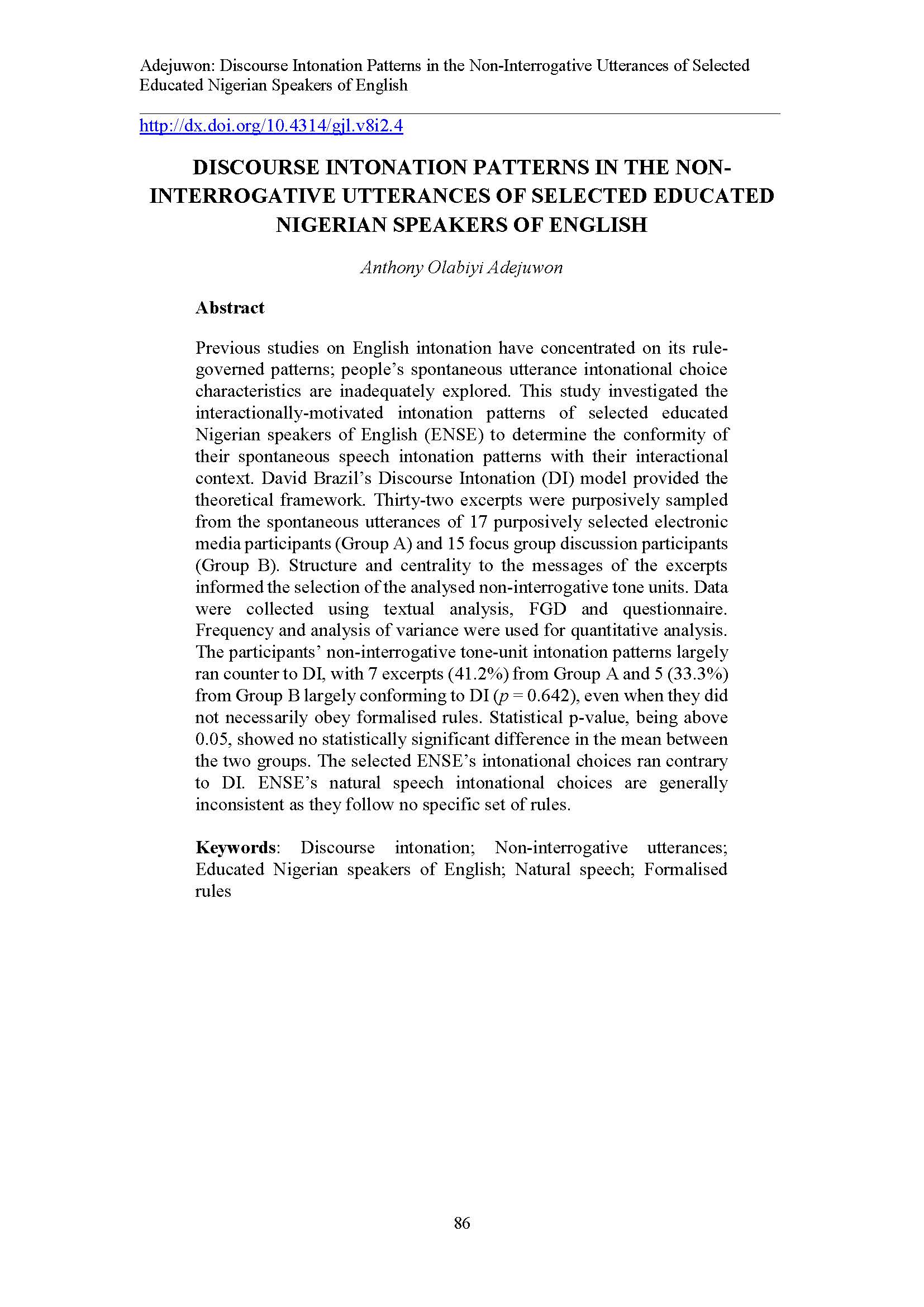Discourse Intonation Patterns in The Non-Interrogative Utterances of Selected Educated Nigerian Speakers of English
DOI:
https://doi.org/10.4314/gjl.v8i2.167Keywords:
Discourse intonation; Non-interrogative utterances; Educated Nigerian speakers of English; Natural speech; Formalised rulesAbstract
Previous studies on English intonation have concentrated on its rule-governed patterns; people’s spontaneous utterance intonational choice characteristics are inadequately explored. This study investigated the interactionally-motivated intonation patterns of selected educated Nigerian speakers of English (ENSE) to determine the conformity of their spontaneous speech intonation patterns with their interactional context. David Brazil’s Discourse Intonation (DI) model provided the theoretical framework. Thirty-two excerpts were purposively sampled from the spontaneous utterances of 17 purposively selected electronic media participants (Group A) and 15 focus group discussion participants (Group B). Structure and centrality to the messages of the excerpts informed the selection of the analysed non-interrogative tone units. Data were collected using textual analysis, FGD and questionnaire. Frequency and analysis of variance were used for quantitative analysis. The participants’ non-interrogative tone-unit intonation patterns largely ran counter to DI, with 7 excerpts (41.2%) from Group A and 5 (33.3%) from Group B largely conforming to DI (p = 0.642), even when they did not necessarily obey formalised rules. Statistical p-value, being above 0.05, showed no statistically significant difference in the mean between the two groups. The selected ENSE’s intonational choices ran contrary to DI. ENSE’s natural speech intonational choices are generally inconsistent as they follow no specific set of rules.
References
Adejuwon, A. (2011). The English Intonation Patterns of Radio Broadcasters in Western Nigeria. Saarbrücken: LAP LAMBERT Academic Publishing GmbH & Co. KG.
Adesina, O.B. (2005). Intonation in the Speech of Senior Secondary School Students in Ibadan North Local Government Area of Oyo State. M.A. Project. Department of English. University of Ibadan.
Akinjobi, A. and Oladipupo, O. (2005). Patterns of Intonation of Some Nigerian Television Reporters. Ibadan Journal of European Studies 5: 1-16.
__________ and ___________. (2010). Intonation and Attitude in Nigerian English. A Journal of Contemporary Research 7.1: 159-167.
Atoye, R.O. (2005). Non-native Perception and Interpretation of English Intonation. Nordic Journal of African Studies 14.1: 26-42.
Brazil, D. (1994). Pronunciation for Advanced Learners of English: Teacher's Book. Cambridge: Cambridge University Press.
_______. (1997). The Communicative Value of Intonation in English. Cambridge: Cambridge University Press.
Cauldwell, R. and Hewings, M. (1996). Intonation rules in ELT textbooks. ELT
Journal 50.4: 327-334. London: Oxford University Press.
Clark, J., Yallop, C. and Fletcher, J. (2007). An Introduction to Phonetics and Phonology. 3rd ed. Oxford: Blackwell Publishing Ltd.
Coulthard, M. (1985). Intonation: An Introduction to Discourse Analysis. London: Longman.
Cruttenden, A. (1986). Intonation. Cambridge: Cambridge University Press.
Gut, U. (2005). Nigerian English Prosody. English World-wide 26.2: 153-177.
Jowitt, D. (2000). Patterns of Nigerian English intonation. English world-wide 21.1: 63-80.
Melefa, O.M. (2011). Rhythmic and Intonational Patterns of NN24’s Newscasting. M.A. Project, Department of English, University of Ibadan.
Okon, B.A. (2001). The Intonational Structure of Nigerian English. Ph.D. Thesis. Department of English, University of Ibadan. The West African Examinations Council (no date). New Regulations and Syllabuses for West African Senior School Certificate Examination, 2013-2016.
The West African Examinations Council (no date). New Regulations and Syllabuses
for West African Senior School Certificate Examination, 2013-2016.
Udofot, I. (1997). The Rhythm of Spoken Nigerian English. PhD. Thesis, University of Uyo.
_______. (2007). A Tonal Analysis of Standard Nigerian English. Journal of Nigerian
English Studies Association 3.1: 58-68.

Downloads
Published
How to Cite
Issue
Section
License
The Ghana Journal of Linguistics is published by the Linguistics Association of Ghana, P. O. Box LG 61, Legon, Accra, Ghana.
LAG Email: linguisticsgh@gmail.com. Website: http://www.laghana.org
GJL Email: gjl@laghana.org Website: http://www.laghana.org/gjl
© Linguistics Association of Ghana and individual authors, 2023.
